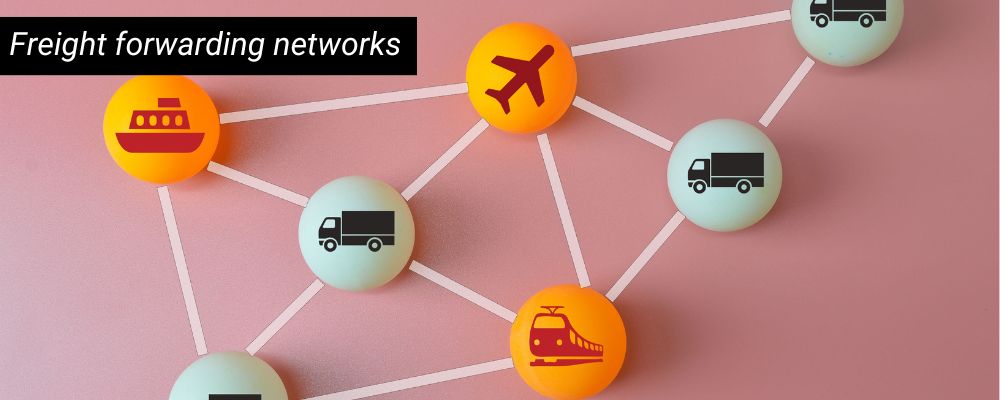
Are you in the freight forwarding business and looking to expand your global reach? Look no further! In today’s blog post, we are diving into the exciting world of exclusive freight forwarding networks. These networks open up a whole new realm of opportunities for businesses like yours, enabling you to connect with trusted partners worldwide and unlock an array of benefits. Join us as we explore how these exclusive networks can revolutionize your operations, boost efficiency, and ultimately propel your business towards unprecedented success. Let’s embark on this journey together and discover the untapped potential that awaits!
Introduction to freight forwarding networks
Freight forwarding networks play a crucial role in the global transportation and logistics industry. These networks bring together freight forwarders, shippers, and other service providers to facilitate the movement of goods from one point to another. In this section, we will provide an overview of freight forwarding networks and their importance in the shipping industry.
What are Freight Forwarding Networks?
Freight forwarding networks can be defined as a group or association of independent freight forwarders who work together to offer comprehensive transportation solutions to their clients. These networks enable freight forwarders to expand their reach, improve their services, and provide more competitive pricing by leveraging resources and expertise from other members within the network.
Members of these networks can vary in size and scope, from small local companies to large multinational organizations. They come together with a common goal of enhancing their capabilities and providing seamless logistics services across different regions and countries.
Importance of Freight Forwarding Networks
In today’s globalized economy, businesses need efficient supply chain management strategies to stay competitive. Thus, freight forwarding networks have become an essential part of the international trade landscape. Here are some reasons why these networks are vital for businesses:
Global Presence: With members located in different parts of the world, freight forwarding networks offer extensive coverage and presence on a global scale. This allows them to handle shipments across multiple countries and continents seamlessly.
Diverse Services: Freight forwarding networks consist of members with diverse expertise in various modes of transportation.
Why join a freight forwarding network?
Freight forwarding is a vital aspect of global trade, ensuring that goods and products reach their intended destination safely and on time. With the ever-growing demands of international commerce, it has become increasingly important for freight forwarders to establish strong partnerships and collaborations in order to stay competitive in the market.
One way for forwarders to expand their business network is through joining a freight forwarding network. These networks bring together independent freight forwarders from different countries, creating an exclusive community of trusted partners who work together to provide efficient and reliable logistics solutions.
But why should you join a freight forwarding network? Here are some compelling reasons:
1. Access to Global Coverage
By joining a freight forwarding network, you gain access to an extensive global coverage. With members located in various regions around the world, these networks allow you to tap into new markets and serve clients in different locations without having to establish physical offices there.
This global reach also means that you can offer your customers more diverse shipping options, including multiple transport modes such as air, sea, rail, and road. This not only expands your service portfolio but also improves your overall competitiveness.
2. Partner with Trusted Companies
In the highly competitive world of logistics, building trust with potential partners can be a challenge. However, when you join a freight forwarding network, you become part of an exclusive community of established companies with proven track records.

Benefits of joining a freight forwarding network
1. Increased global presence and reach
One of the key benefits of participating in an exclusive freight forwarding network is the increased global presence and reach it provides to its members. In today’s interconnected world, having a strong international presence is crucial for businesses looking to expand their operations and tap into new markets. By joining an exclusive freight forwarding network, companies gain access to a vast network of partners and agents across different countries and continents.
The power of a global network lies in its ability to connect businesses with reliable and reputable partners around the world. Through these connections, freight forwarders can offer their customers a wider range of services and solutions, covering various modes of transportation, customs clearance procedures, warehousing facilities, and more. This allows them to better meet the diverse needs of their clients while also expanding their service capabilities.
Moreover, being part of an exclusive freight forwarding network enables companies to enter new markets with ease. As they have already established relationships with trusted partners in those regions, they can quickly access local knowledge and expertise that would otherwise take years to build. This gives them a competitive edge over non-networked competitors who may struggle to find reliable partners or navigate unfamiliar territories.
Another advantage of an expanded global presence is the increased brand recognition that comes with it. By collaborating with other members within the network, companies can showcase their strengths and capabilities on a larger scale. This exposure not only helps them attract new business but also positions them as reputable players in the industry.

2. Access to trusted partners and agents
Access to trusted partners and agents is a key aspect of exclusive freight forwarding networks. These networks consist of a carefully selected group of highly experienced and reliable logistics companies, who work together to provide seamless transportation solutions for their clients.
One of the main benefits of being part of an exclusive freight forwarding network is having access to a global logistics network of trusted partners and agents. These partners and agents have been thoroughly screened and chosen based on their expertise, reputation, and track record in the industry. This ensures that every shipment is handled by competent professionals who adhere to the same high standards as the members of the network.
Having access to such a vast network allows freight forwarders to expand their reach and offer services in new markets without having to invest in establishing their own offices or infrastructure. This can be especially beneficial for small or medium-sized freight forwarders who may not have the resources or capabilities to enter into new territories on their own.
Moreover, being part of an exclusive freight forwarding network means having access to local knowledge and expertise. Each partner/agent within the network has extensive knowledge about their respective regions, including customs regulations, documentation requirements, infrastructure limitations, and cultural nuances. This level of understanding can be crucial when navigating through complex shipping processes in different countries.
Another advantage of accessing trusted partners and agents through an exclusive freight forwarding network is the ability to offer specialized services. As these networks consist of members with diverse areas of expertise, they can collaborate with each other to provide customized solutions for specific industries or types of cargo.
3. Professional development opportunities
Professional development opportunities are crucial for the growth and success of any freight forwarding business. In the fast-paced and ever-evolving logistics industry, it is important for professionals to constantly update their skills and knowledge to stay ahead of the competition. Exclusive freight forwarding networks offer a range of professional development opportunities that can benefit both individuals and businesses.
- Training Programs: Most exclusive freight forwarding networks organize training programs and workshops on various aspects of logistics, such as supply chain management, customs regulations, freight documentation, and more. These training sessions are conducted by industry experts and provide participants with valuable insights and practical knowledge that they can apply in their day-to-day operations.
- Webinars and Online Courses: With the increasing use of technology in the logistics sector, many exclusive networks also offer webinars and online courses on relevant topics. These virtual learning opportunities allow members to enhance their skills without having to leave their offices or homes. They also provide a platform for networking with other professionals from around the world.
- Mentorship Programs: Some exclusive freight forwarding networks have mentorship programs where experienced members guide newer or less experienced ones through various challenges they may face in their professional journey. This allows for peer-to-peer learning and provides new perspectives on common industry issues.
- Conferences and Events: Exclusive networks often host conferences, seminars, or events that bring together professionals from different parts of the world to share insights, discuss trends, network with potential partners or clients, among other things.
4. Considerations such as network size, reputation, and services offered
When it comes to choosing a freight forwarding network to join, there are several important considerations that should be taken into account. These factors can greatly impact the success and effectiveness of your business within the network, so it is crucial to carefully evaluate them before making a decision.
One of the first things to consider is the size of the network. A larger network typically means more opportunities for collaboration and potential business partnerships. It also indicates a higher level of credibility and stability within the industry. However, being part of a smaller, more niche network may offer unique advantages such as specialized services or closer relationships with other members.
Another important factor is the reputation of the network. This includes not only its overall standing in the industry but also how it is perceived by other freight forwarding companies. A reputable network will have established trust and reliability among its members, which can translate into better business opportunities and referrals.
It is also essential to look at the types of services offered by the freight forwarding network. Every company has different needs when it comes to logistics and supply chain management, so finding a network that offers services tailored to your specific requirements can be incredibly beneficial. Some networks may specialize in certain modes of transport or have expertise in handling specific types of cargo, while others may offer comprehensive end-to-end solutions.
Furthermore, you should consider whether the services provided by the network align with your company’s values and goals. For example, if sustainability is an important aspect for your business, joining a network that promotes eco-friendly practices would be a good choice.
5. Researching the network’s member criteria and requirements
When considering joining an exclusive freight forwarding network, it is important to thoroughly research the membership criteria and requirements of each network. This will ensure that you choose a network that aligns with your business goals and values, and also meets any specific needs or preferences you may have.
The first step in researching a network’s member criteria is to understand the purpose and objectives of the network itself. Exclusive freight forwarding networks are formed with the goal of connecting reputable and reliable logistics companies from around the world, creating a powerful global alliance that benefits both members and their clients. Therefore, it is essential to look into the history, reputation, and track record of a network before applying for membership.
One key aspect to consider when researching member criteria is geographic coverage. Some networks may have strict requirements for geographical representation, meaning they only accept members from certain countries or regions. This can be beneficial if your business operates primarily in a specific area and you want to connect with partners in other parts of the world. However, if your company has a wider global reach, it may be more beneficial to join a network with more diverse geographical representation.
Another important factor to consider is the size and scope of the network. Exclusive freight forwarding networks vary in size from smaller regional associations to large global alliances. Each has its own benefits – smaller networks may offer more personalized support and opportunities for collaboration within a closer-knit community, while larger networks may provide access to a wider range of resources and connections on a global scale.
6. Evaluating
Evaluating potential freight forwarding networks is a crucial step in finding the right fit for your business. It involves thorough research, analysis, and consideration of various factors to ensure that the network aligns with your specific needs and goals. In this section, we will discuss some key steps you can follow to effectively evaluate different freight forwarding networks.
- Define Your Requirements: The first step in evaluating freight forwarding networks is to clearly define your requirements. This includes understanding your shipping volume, destinations, modes of transport, and any unique service requirements. By having a clear understanding of what you need from a network, you can better assess if they have the necessary capabilities to meet your needs.
- Research Potential Networks: Once you have identified your requirements, it’s time to start researching potential networks. A simple internet search can provide you with a list of options; however, it’s important to go beyond just their website and dig deeper into their services, reputation, and experience in the industry.
- Consider Their Global Presence: One of the main reasons for joining an exclusive freight forwarding network is access to a global network of partners and agents. Therefore, it’s essential to consider the network’s global presence before making a decision. Look at their coverage map and partner agencies in different regions to ensure they have a strong presence in areas where you do or plan on doing business.
- Evaluate Their Expertise: Attending conferences is crucial for those involved in logistics, as they offer valuable opportunities for learning and networking.
